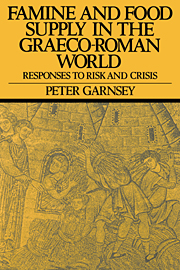Book contents
- Frontmatter
- Contents
- List of tables and figures
- Preface
- Abbreviations
- Maps
- PART I THE INCIDENCE AND SEVERITY OF FOOD CRISIS
- PART II SURVIVAL STRATEGIES
- PART III FOOD SUPPLY AND FOOD CRISIS IN ATHENS C. 600–322 BC
- PART IV FOOD SUPPLY AND FOOD CRISIS IN ROME C. 509 BC – AD 250
- CONCLUSION
- CONCLUSION
- Bibliography
- Index
- Frontmatter
- Contents
- List of tables and figures
- Preface
- Abbreviations
- Maps
- PART I THE INCIDENCE AND SEVERITY OF FOOD CRISIS
- PART II SURVIVAL STRATEGIES
- PART III FOOD SUPPLY AND FOOD CRISIS IN ATHENS C. 600–322 BC
- PART IV FOOD SUPPLY AND FOOD CRISIS IN ROME C. 509 BC – AD 250
- CONCLUSION
- CONCLUSION
- Bibliography
- Index
Summary
Food crisis was endemic in the Mediterranean in classical antiquity. Its origins lay in nature and in man, often operating together. Harvest failure was an underlying cause of food shortage. However, food crisis was the consequence of a sharp reduction not in the absolute level of food supply, but in food availability. The causes of famine are to be sought not only in the physical environment and conditions of production, but also in distribution mechanisms, their limitations, and their disruption through human intervention.
Not every food crisis was catastrophic, on the scale of famine. Food crises ranged from mild, transient shortage to protracted, devastating famine. Shortage was common, but famine rare, the outcome of abnormal conditions. Every food crisis was a specific event; it can be classed in terms of its whereabouts on the shortage/famine spectrum, supposing adequate information exists about causes, context and impact. The most serious food crises were a consequence of a succession of harvest failures, wars of long duration or the conjunction of harvest shortfall and epidemic disease. Severe inflation in the prices of foods (as opposed to non-food items), drastic reactions by both ordinary consumers and governments, and above all a sharp rise in mortality among all classes other than the rich (who were vulnerable to disease but not starvation), are other indications that a given food crisis belongs towards the famine end of the spectrum.
The unique urban civilisations of antiquity were supported, when all is told, by the common labour of peasants. The survival of the peasantry hinged on the nature of their response to environmental constraints and to the demands of those wielding political and economic power.
- Type
- Chapter
- Information
- Famine and Food Supply in the Graeco-Roman WorldResponses to Risk and Crisis, pp. 271 - 277Publisher: Cambridge University PressPrint publication year: 1988

